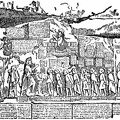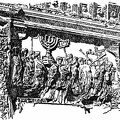Alexander died in Babylon when not quite thirty-three years old. In actual and immediate achievement he surpassed perhaps every other man who has ever lived. He founded an empire which he himself had conceived and developed, which covered nearly all the then known world, and which, though it was composed mainly of barbarous and semi-barbarous people, was dominated by Greek thought. It is true that the empire fell apart almost immediately after Alexander died. But it did not fall into anarchy, or revert to its previous state: it was divided into four parts, each of which was distinct, self-governing and well organized. The two larger parts, the kingdom of the Seleucidæ, which occupied approximately the territory of Persia, and the kingdom of the Ptolomies, or Egypt, continued as torch-bearers to civilization for many centuries thereafter.
Of the two, the former was the larger and was probably the better, from an administrative point of view; but Egypt represented the finer civilization; for Alexandria, with its library and its wonderful museum, became the seat of learning and the resort of the scholars of the world, and the centre of the Hellenistic civilization that followed that of Greece.
- Author
- Invention
The Master-key to Progress
Author: Bradley A. Fiske
Available from www.gutenberg.org
Published in 1921 - Posted on
- Wednesday 3 November 2021
- Dimensions
- 887*593
- Tags
- Ancients, Place:Greece
- Albums
- Visits
- 688
- Downloads
- 41
 Download Photo
Download Photo





